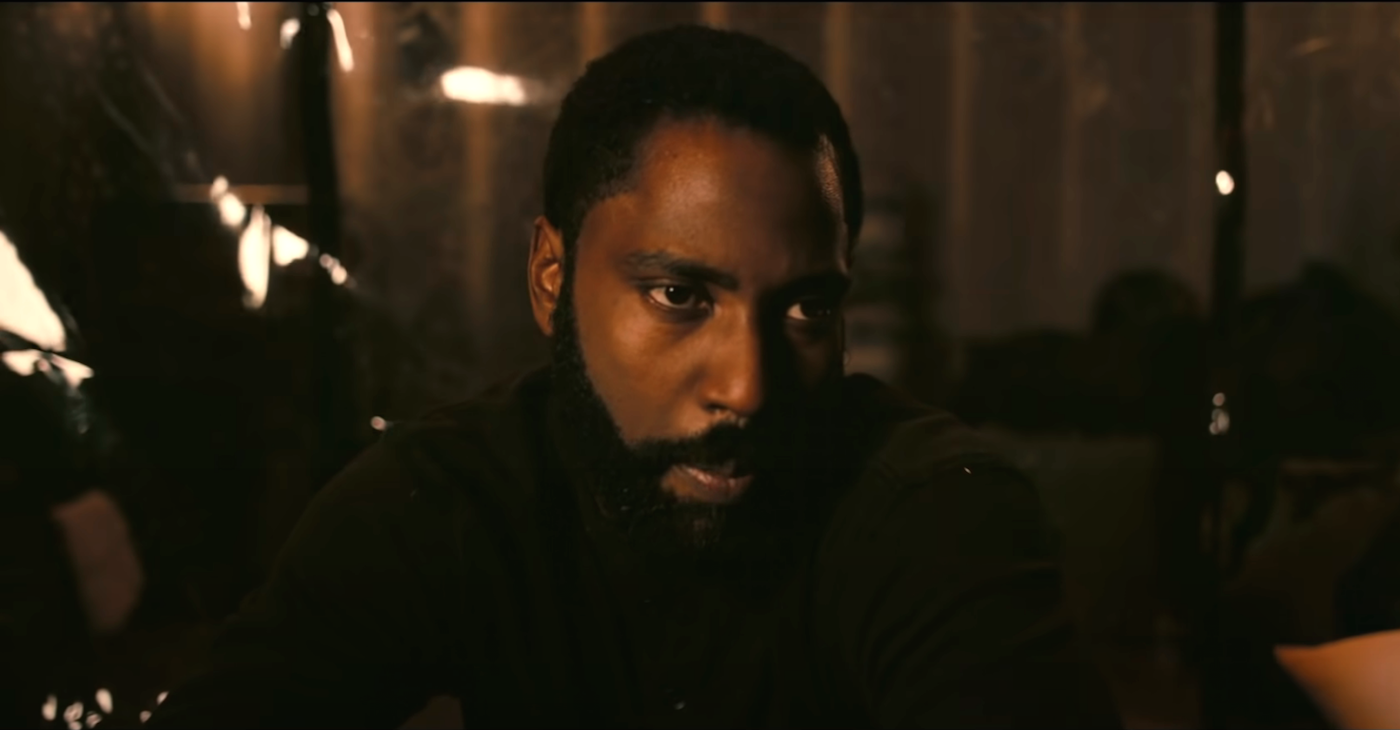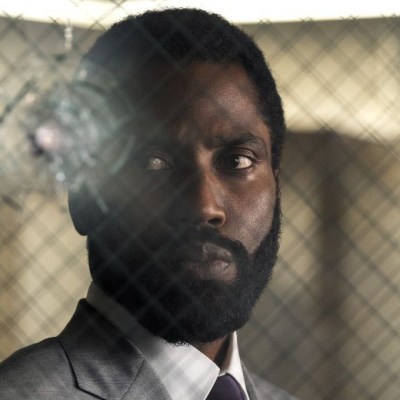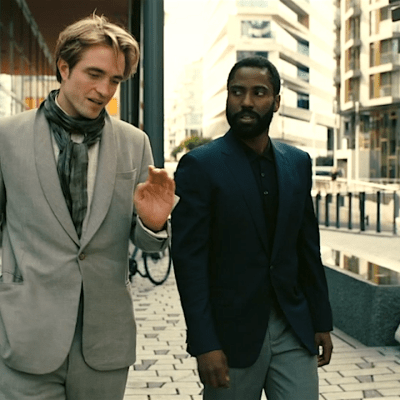This article contains Tenet spoilers.
The Protagonist might be one of the most unimaginatively named main characters of all time, but it’s worth pointing out that he is referred to as “the Protagonist,” which is notably different from being called “the Hero.”
Of course it’s not hard to argue he’s a good guy who does good guy things. He is fighting against a gangster who regularly kills people and has trapped his wife in an abusive marriage. He saved all those unconscious hostages from those bombs (maybe, we’re still figuring that out). His goal is stated, multiple and explicit times, to be saving the world. That makes him a good guy, right?
His goal, ultimately, is to prevent the assembly of the “Algorithm,” which a future adversary will use to invert the flow of time, wiping out the past and potentially destroying all existence in the process. It’s complicated, as we’ve covered before, but you can skip an awful lot of the explanation to get to the “and then the world ends” part and decide, yes, yes this person is doing Hero Things.
So that means the people he’s fighting must be villainous, right? Well…
A Not-So Evil Villain
Sator is, by anyone’s estimate, a bad egg. We’ve covered that. But when he tells us his goal, it’s not one of ultimate destruction. He tells the Protagonist, “I want to create a new world. Somewhere, once, a man in a crystal tower presses a switch, and Armageddon is both triggered and prevented. Time itself changes direction. The sunshine we enjoyed will warm the faces of our descendants.”
That sounds pretty nice, and while we can all agree Sator is a wrong ‘un who deserves to be shot and slip-n-slided off his own yacht, the people he’s working for in our future have some pretty understandable motivations.
Sator tells us they are reversing time “because their oceans rose and their rivers dried up. They have no choice but to turn around. We are to blame for that.”
He’s right. No reasonable person can deny climate change is going to be absolutely catastrophic if not prevented. Faced with that, a giant reset button, an opportunity to live in an abundant and imagined past is surely understandable.
The Protagonist doesn’t think so, which might be fair enough, but his justification is, well, weird.
He tells Sator “Each generation provides for its own survival.” Now I’m sorry, but that is a bloody weird justification for screwing over your own descendants. To get a bit dangerously political for a second, that line has extreme “Why shouldn’t we inflate the housing market so our kids are forced to rent forever?” vibes. It sounds very “Why should I bother about carbon footprints if I’m not going to live to see the consequences?” In a film where one of the characters’ primary motivations (and, some might say, only actual personality trait) is that they want to protect their child, saying “Screw you” to your children’s children’s children rings oddly.
But whatever we think of the Protagonist’s arguments, the truth remains that the Algorithm is going to blow up the universe if it is used, and so the Protagonist is right to stop it, even if he has to be a dick about it. Right?
Well to answer that, we have to look at Tenet as a time travel movie, and an espionage movie, and how those two things interact. They do this nowhere more profoundly than in the repeated phrase “Ignorance is our ammunition.”
Ignorance is Whose Ammunition?
We’ve covered the time travel rules of Tenet before, and they seem pretty cut and dried. What happens stays happened, history can’t be changed, you can watch a film forward or in reverse, but the events still play out the same. It’s a model that appeals to Christopher Nolan’s sensibilities as a filmmaker.
What “Ignorance is our ammunition” means in terms of Time Warfare refers to the immutability of the past and future. The past and future are like the cat in Schrödinger’s thought experiment. It is alive and dead until somebody looks at it and it becomes one or the other.
You remain ignorant of how a mission you’re about to carry out goes so that you don’t find out if it ends badly and then get stuck on that course. Every piece of information you learn becomes a shot fired, an event that cannot unhappen.
But at the same time, you don’t tell other people the future when things go well so that events go as they already have. That hints that maybe things can change. We’ll get to that, but first we’re going to pull our own pincer movement and look at what “ignorance is our ammunition” means in terms of espionage.
Here the meaning of the phrase is far more obvious. In espionage, information must be constantly compartmentalized. Plausible deniability, need-to-know, isolation of active parties to prevent information from falling into enemy hands.
Neil, played by Robert Pattinson, is perhaps the greatest advocate of not-knowing-shit, coming out with such pithy quotes as “lying is the standard operational procedure” and “policy is to suppress.”
This extends even to thinking critically at all, when the scientist who delivers the Protagonist his first info dump tells him, “Don’t try to understand it. Feel it.” It’s a line that feels like a heavy wink toward the viewer, but it also seems to warn the Protagonist himself from thinking critically.
The only person who suggests that the Protagonist should be asking more questions is that old bastard Sator, again. He tells the Protagonist, “You’re fighting for a cause you barely understand, with people you trust so little that you have told them nothing.” When he calls the Protagonist a fanatic, it’s hard to argue.
Perhaps the most damning clue comes from Fay, the CIA boss who recruits the Protagonist into Tenet in the first place. He introduces the Protagonist to the fight saying, “There’s a cold war. Cold as ice. To even know its true nature is to lose.”
The nature of the war is that the Earth faces a climate catastrophe that will render it uninhabitable, and the Protagonist is fighting to ensure it happens. Knowing that would definitely hurt your resolve.
There Is No Answer, It’s A Paradox
But once again, the Earth dying at some future time is still a better outcome then everything being obliterated in an instant right now, right? After all, throughout the film it is shown time and time again that history can’t be changed.
Except, does anybody really try?
Read more
When the Protagonist tries to warn Neil, knowing he’s about to go to his death, Neil argues, “We just saved the world, can’t leave anything to chance.” The Protagonist asks, “But can we change things if we do it differently?” and he’s just met with a glib “what’s happened, happened.”
Neil responds with some philosophical stuff about fate, and we’ve argued about free will before. But the point is, the Protagonist could have just gone back with Neil, made sure he didn’t get killed, and history would have changed (for better or worse). But he doesn’t.
Neil himself appears less certain about “What’s happened, happened” elsewhere in the film. When the Protagonist argues, “Doesn’t us being here now mean it never happened?” Neil will only offer an “Optimistically, I’d say that’s right.”
Pessimistically, Neil starts talking about “parallel worlds theory” and “multiple realities,” admittedly in the most garbled and non-sensical way possible, and elsewhere he explains the Grandfather Paradox, even though I’m pretty sure anyone going to see Tenet already knows that one by now.
However, he also let’s slip that there are other opinions that “in the future, those in power clearly believe you can kick grandpa downstairs, gouge his eyes out, slit his throat, without consequence.”
When the Protagonist asks if they could be right, Neil evasively says, “It doesn’t matter.” Even the scientist who sends the Algorithm back in time is compared to Oppenheimer in the doomsday scenario she predicted—Oppenheimer believed (or at least scientists working for him in Los Alamos) that a nuclear bomb might ignite the Earth’s atmosphere. But that theory was also wrong.
So maybe the barrier here isn’t physics or time travel logic. Maybe it’s politics.
The Protagonist and the End of History
Above and beyond being a time travel movie, Tenet is a spy movie. It may, in fact, be the Bond movie that Christopher Nolan never made. But I’d argue it draws its influences from a very specific era of spy movie. The plot throws allusions to nuclear weapons and cold warfare, echoing the spy movies from the height of the Cold War. At one point in time the war is referred to as “ice cold,” which sort of means there’s no danger of violence breaking out, so I’m not sure what Nolan meant by that.
But the film feels resonant of the spy movies of the ‘90s and early ‘00s. In these films, The Saint, Death Train(or Detonator as it’s known elsewhere), The Sum of All Fears, and Tomorrow Never Dies, the world is relatively, and for a spy movie, irritatingly stable. The Cold War is over. 9/11 has yet to dominate the global consciousness. It’s a time period whose beginning is marked by the publication of The End of History and the Last Man by American political scientist Francis Fukuyama. Fukuyama argues that with the ascendancy of Western liberal democracy and the dissolution of the Soviet Union, history was done. No more world wars. No more revolutions. No huge economic shifts. The future, looked at from the ‘90s, was an everlasting capitalist liberal democracy with incrementally better gadgets as time went on.
In these films the threat isn’t a foreign power, or a political entity equal in might to America’s own; it’s the idea that “history” might restart, that the eternal status quo we were promised might be upended.
And ultimately, this is what most spy movies are about. Spies aren’t revolutionaries (not in their own country anyway). They are government employees, and typically stability is the highest cause that they fight for.
Like the Tenet organization, and the Protagonist, they are fighting for the status quo, they’re not interested in improving anything.
The Protagonist ends the film realizing that he is in charge of Tenet, that he most likely founded the organization. But even in founding it, he has no agency, he won’t change anything. As the mastermind of the Tenet group he is still following orders.
When the Protagonist is asking all his questions about Tenet’s time travel logic, Neil tells him, “We’re the people saving the world from what might have been.”
But not once does the Protagonist wonder if what might have been could have been an improvement.


